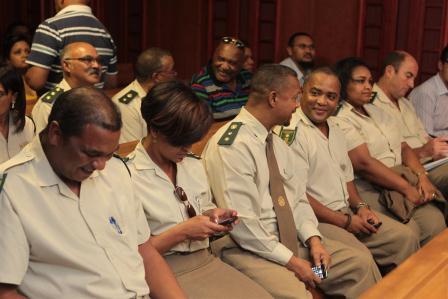 In the case which appears before the Constitutional Court on Wednesday 18 November 2015, Coloured employees of the Department of Correctional Services (DCS), in their fight against the implementation of national demographics instead of regional demographics for employment quotas in the Western Cape where Coloureds are in the majority, have been abondonned by political parties including the Democratic Alliance (DA) which is the ruling party in the province.
In the case which appears before the Constitutional Court on Wednesday 18 November 2015, Coloured employees of the Department of Correctional Services (DCS), in their fight against the implementation of national demographics instead of regional demographics for employment quotas in the Western Cape where Coloureds are in the majority, have been abondonned by political parties including the Democratic Alliance (DA) which is the ruling party in the province.
Solidairty, the trade union acting on behalf of the DCS employees issued a press release that questions why the party which relies on the Coloured vote to keep them in power in the province, is silent on an issue that will affect their majority voter base in the province in all other sectors of employment if the DCS policies are upheld in the ConCourt. - Editor
Coloureds are on their own – Solidarity
While battle orders were being prepared this week prior to the largest affirmative action case yet in South Africa, the Coloured employees of the Department of Correctional Services (DCS) are fighting a lonely battle. This is according to trade union Solidarity concerning its affirmative action court case against the DCS to be heard in the Constitutional Court next week.
According to Dirk Hermann, Chief Executive of Solidarity, with the upcoming municipal elections next year, political parties are keeping mum about the case. “The Cosatu trade union, Popcru, has decided to act against these members as friend of the court; the state is pulling out all stops against them; even the South African Police Service has joined the fray as friend of the court against them; and no civic organisation has stepped in for them as friend of the court,” Hermann says.
The three-year battle between Solidarity and the DCS is about the lawfulness of the DCS’s affirmative action plan, which is aimed at enforcing the national racial demography in every province.
According to Hermann a negative outcome in the case will have far-reaching consequences for the Coloured community in the Western Cape. “If it is found that affirmative action plans enforcing the national racial demographics in a province such as the Western Cape is lawful, it would mean that Coloured South Africans will have to be managed downward from their provincial representation of 52% to approximately 9%, the national figure, and consequently there will be about 1 million Coloured South Africans too many in the Western Cape. The effect for other minorities such as the Indian community in KwaZulu-Natal, the Coloured community in the Western Cape and also white South Africans in the rest of South Africa will be equally drastic,” Hermann says.
If Solidarity wins the case, the face of affirmative action in the Public Service and also in the private sector will change for ever.
Despite the possible catastrophic consequences that a negative outcome in the case may have for the Coloured community in the Western Cape, the ruling party in the province has decided to keep a low profile. “The DA is so preoccupied with positioning itself for black support in the 2016 municipal elections that they prefer to say as little as possible on the case. In private conversations they will say how important it is for Solidarity to fight the case, but in public forums a deathly silence prevails. In a personal conversation with Mmusi Maimane, leader of the DA, I explained the importance of the case and said the community would like to see him and other leaders in court. The DA is avoiding the political dilemma at the expense of the majority in the Western Cape,” Hermann says.
“The Western Cape regional secretary of Cosatu, Tony Ehrenreich, has come out several times in the media against the application of the national racial demographics in the Western Cape. In spite of this lip service, the Cosatu trade union Popcru has positioned itself as friend of the court against the case of the DCS employees. Cosatu’s stance in court is that the national racial demographics may be used to discriminate against the Coloured employees in the Western Cape. It is unheard of for a trade union to act for the employer and against the employees.”
Marius Fransman, leader of the ANC in the Western Cape, is also as silent as the grave about the case. “The ANC’s national policy on affirmative action makes it clear that the national racial demographics has to be reflected in every province and at every job level. This is demonstrated in the affirmative action plans of all government departments. In the DCS case, the SAPS has also intervened as friend of the court, which shows how serious they and the state view this case. The state would not be conducting the case with so much aggression if Luthuli House did not support it,” Hermann says.
And no civic organisation has joined the case as friend of the court on the side of the DCS employees.
“In South Africa racial demographics has become politics. Everybody is positioning themselves for the racial majority. Coloured people’s votes are appreciated, but their legitimate battle, unfortunately, is not politically correct. The Western Cape voters are being sacrificed for a bigger national strategy,” Hermann says.
The case will be heard in the Constitutional Court in Johannesburg on Wednesday 18 November.
Click here to view the original press release.
